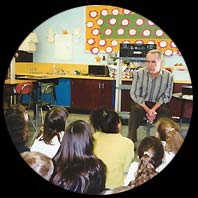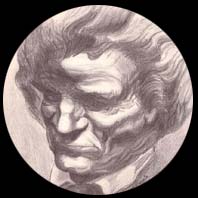| |
|
 |
| |
|
Who is Steve? Read what he says: "My passion for Beethoven has been with me for over 50 years. I teach history and appreciation of classical music in the elementary schools in my town on a part time basis. Needless to say with all the stories I have read and picked up about Ludwig van Beethoven over the years I now relay to the students, this makes Beethoven No. 1 with them. They love hearing about his childhood, his early years and late ones as a composer..." Read both articles about Steve's works with Beethoven for kids in newspapers dated May 2003. |
|
|
|
| |
 In the classroom |
My name is Steve. I live in a community 15 miles north of Boston, MA. As a lifelong fan of classical music, on my retirement in 1998, I thought perhaps to put my experience to some use. Contacting a local public elementary school, I inquired about the possibility of developing a classical music program for children in grades two through five. With the school principal's support, a program aimed at children, ages 7 to 11 was begun. Two more public schools have since enrolled. Not being a professional teacher guaranteed a certain amount of trial and error in this new endeavor, but after a few months, with help from the school staff, my daughter (who is a teacher) and my wife, the program was proceeding nicely. |
Beethoven for kids provided the starting point. At the opening bars of the 5th symphony (our first piece), the students cried out in unison "Hey! I know that music!" And the floodgates were opened. Questions shot out like, "Is he still alive?" "How old is he?", "What other 'songs' did he do?" The 4th movement from the 9th symphony again prompted the response, "I've heard that before!" and they proceeded to hum along with the recording. Needless to say, I was delighted. And it seemed the more they learned of the life and times of Ludwig, the more of his music they wanted to hear. But let me deviate a moment and tell you that by now they were also hearing the works of Haydn, Mozart, Schubert, Prokofiev etc, but the discussion always seemed to go back to Beethoven- as if they could not get enough of the man and his music. Students in the 3rd grade can tell you the story behind the erroneously titled "Für Elise," as well as when Beethoven was born and when he died. Some children struggle to understand how he could compose, being deaf, but subsequently come to grasp how, as one student put it, "It's like when you hear a song in your head but you're not singing it out loud." Students seem especially responsive to Beethoven's personal struggles. They are intrigued by stories of his turbulent and troubled life, particularly those relating to his childhood and his deafness. Many appear to openly relate to Beethoven's adversities and relish his human imperfections- taking a unique delight in his surliness, his sometimes atrocious manners and his slovenly habits. But above all things, children revere his fiercely rebellious, independent spirit. Stories of Beethoven's refusal to bow to monarchy never fail to get their admiring attention. |
|
Students also appreciate how Beethoven struggled with his music- revising and rewriting- working very hard to achieve what he wanted to achieve. They are amazed to hear how simple some of the basic themes are that underlie his elaborations. One student said, "Beethoven sure got a lot of music out of four notes," referring to the 5th symphony's 1st movement. The program also reaches out to special needs students, who, to my astonishment, often react as if they had been exposed to Beethoven long before the classes started. The facial and bodily expressions of some, convince one that Beethoven did, indeed, compose "from the heart, to the heart," for all mankind. And, in my experience, students admire that he composed, not just for the elite, but for everyone- themselves included. They marvel that we can still value and play music written 200 years ago. |
 Portrait of Beethoven by Kent McKenzie |
|
I have found videos to be helpful teaching tools in teaching Beethoven for kids and have utilized one dramatizing the composer's life, and others of the 5th and 9th symphonies concerts. Cartoons are especially effective with 2nd and 3rd graders. There are numerous cartoons and movies that host subjects relating to classical music or have classical music scores. Ultimately, students come to realize that classical music is all around them, a part of their daily lives. And it thrills me now when students tell me they do their homework to classical music or that they go to bed listening to the works of Beethoven. This program has certainly been a tremendously rewarding and joyful process for myself, and I'd like to think, for many of the students as well. I wish to thank Dr. Kathleen Stanton, Mr. Victor Leone and Mr. John Fauci who encouraged the program in my town, Saugus Massachusetts. |
|
|
|
|
|
 |
|
|||||||||||||||||
